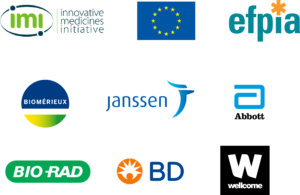 Recruitment for the VALUE-Dx studies, ADEQUATE-paediatric and PRUDENCE, was successfully concluded in January 2024. This marks the beginning of a whole new phase in VALUE-Dx that involves data cleaning, statistical analysis, microbiological analysis of samples and health-economic modelling.
Recruitment for the VALUE-Dx studies, ADEQUATE-paediatric and PRUDENCE, was successfully concluded in January 2024. This marks the beginning of a whole new phase in VALUE-Dx that involves data cleaning, statistical analysis, microbiological analysis of samples and health-economic modelling.
About the studies
ADEQUATE aims to assess the impact of rapid syndromic diagnostic testing, BioFire® Respiratory Panel 2.1 plus (bioMérieux), in patients with acute respiratory tract infections (ARTI) at the emergency departments of hospitals on admission rates, antimicrobial prescriptions and clinical outcome. ADEQUATE enrolled 522 participants. From a subset of these participants, oropharyngeal swabs were collected on the day of randomisation and on day 30 , as part of a microbiology sub-study.
PRUDENCE aims to determine if point-of-care Community Acquired-ARTI diagnostic (CA-ARTI-Dx) tests could lead to more appropriate prescribing decisions for both upper and lower RTI in community care setting. The selected tests are Abbott AfinionTM CRP (Abbott) and BD VeritorTM System for Influenza A+B (Flu) and for Group A Streptococcus (GAS). PRUDENCE enrolled 2649 participants, with 2240 in the primary care arm and 209 in the long term care facility arm. From 112 participants nasopharyngeal swabs, stool samples and blood samples were taken for the microbiology-biomarker sub-study.
Next steps
The PRUDENCE and ADEQUATE data collection using electronic Case Report Forms (eCRFs) concluded on March 17, with a meticulous data cleaning process revealing minimal unresolved queries. Once all necessary queries have been resolved and all updates are completed, variables for unblinding will be added to final datasets upon confirmation from the study teams, with unblinded datasets subsequently uploaded to the Data Repository Environment (DRE).
Samples from the local sites to the central laboratory, where they will be further processed at the University of Antwerp (UA). The oropharyngeal swabs from ADEQUATE will be analysed using metagenomic sequencing to characterise the influence of antibiotic treatment on the composition of upper respiratory tract microbiome and antimicrobial resistance patterns. The swabs and stool samples of PRUDENCE will be analysed to assess whether selection of resistant pathogens occurs under antibiotic pressure.
Upon release of the unblinded datasets, statisticians in Oxford (UK) and Basel (Switzerland) will rigorously implement their Statistical Analysis Plans while the health-economics teams at UMC Groningen in The Netherlands and La Rioja University in Spain will use their custom-made models to provide valuable insights into the effectiveness (including projected long-term impact on antimicrobial resistance) and cost-effectiveness of a broader point-of-care testing strategy in the context of respiratory infections.


